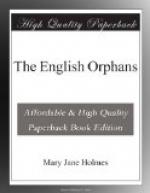She replied it was not money she coveted, but reputation,—a name,—to be pointed at as Mrs. Sarah Furbush, authoress of “Furbush’s Grammar,” &c.,—this was her aim!
“You may write all you choose for the entertainment of ourselves and our friends,” said George, “but I cannot allow you to send any thing to a publisher,”
Sally saw he was in earnest, and at last yielded the point, telling Mary in confidence that “she never saw any one in her life she feared as she did Esquire Moreland when he set his foot down!”
And George did seem to have a wonderful influence over her, for a single look from him would quiet her when in her wildest moods. In spite of the desire she once expressed of finding her sister, Mrs. Campbell’s pride at first shrank from acknowledging a relationship between herself and Sally Furbush, but the fact that George Moreland brought her to his home, treating her in every respect as his equal, and always introducing her to his fashionable friends as his aunt, gradually reconciled her to the matter, and she herself became at last very attentive to her, frequently urging her to spend a part of the time with her. But Sal always refused, saying that “for the sake of her niece she must be very particular in the choice of her associates!”
True to her promise, on Mary’s twenty-first birth-day, Mrs Campbell made over to her one fourth of her property, and Mary, remembering her intentions towards William Bender, immediately offered him one half of it. But he declined accepting it, saying that his profession was sufficient to support both himself and Jenny, for in a few weeks Jenny, whose father had returned from California, was coming, and already a neat little cottage, a mile from, the city, was being prepared for her reception. Mary did not urge the matter, but many an article of furniture more costly than William was able to purchase found its way into the cottage, which with its overhanging vines, climbing roses, and profusion of flowers, seemed just the home for Jenny Lincoln.
And when the flowers were in full bloom, when the birds sung amid the trees, and the summer sky was bright and blue, Jenny came to the cottage, a joyous, loving bride, believing her own husband the best in the world, and wondering if there was ever any one as happy as herself. And Jenny was very happy. Blithe as a bee she flitted about the house and garden, and if in the morning a tear glistened in her laughing eyes as William bade her adieu, it was quickly dried, and all day long she busied herself in her household matters, studying some agreeable surprise for her husband, and trying for his sake to be very neat and orderly. Then when the clock pointed the hour for his return, she would station herself at the gate, and William, as he kissed the moisture from her rosy cheek, thought her a perfect enigma to weep when he went away, and weep when he came home.
There was no place which Ella loved so well to visit, of where she seemed so happy, as at the “Cottage,” and as she was of but little use at home, she frequently spent whole weeks with Jenny, becoming gradually more cheerful,—more like herself, but always insisting that she should never be married.




